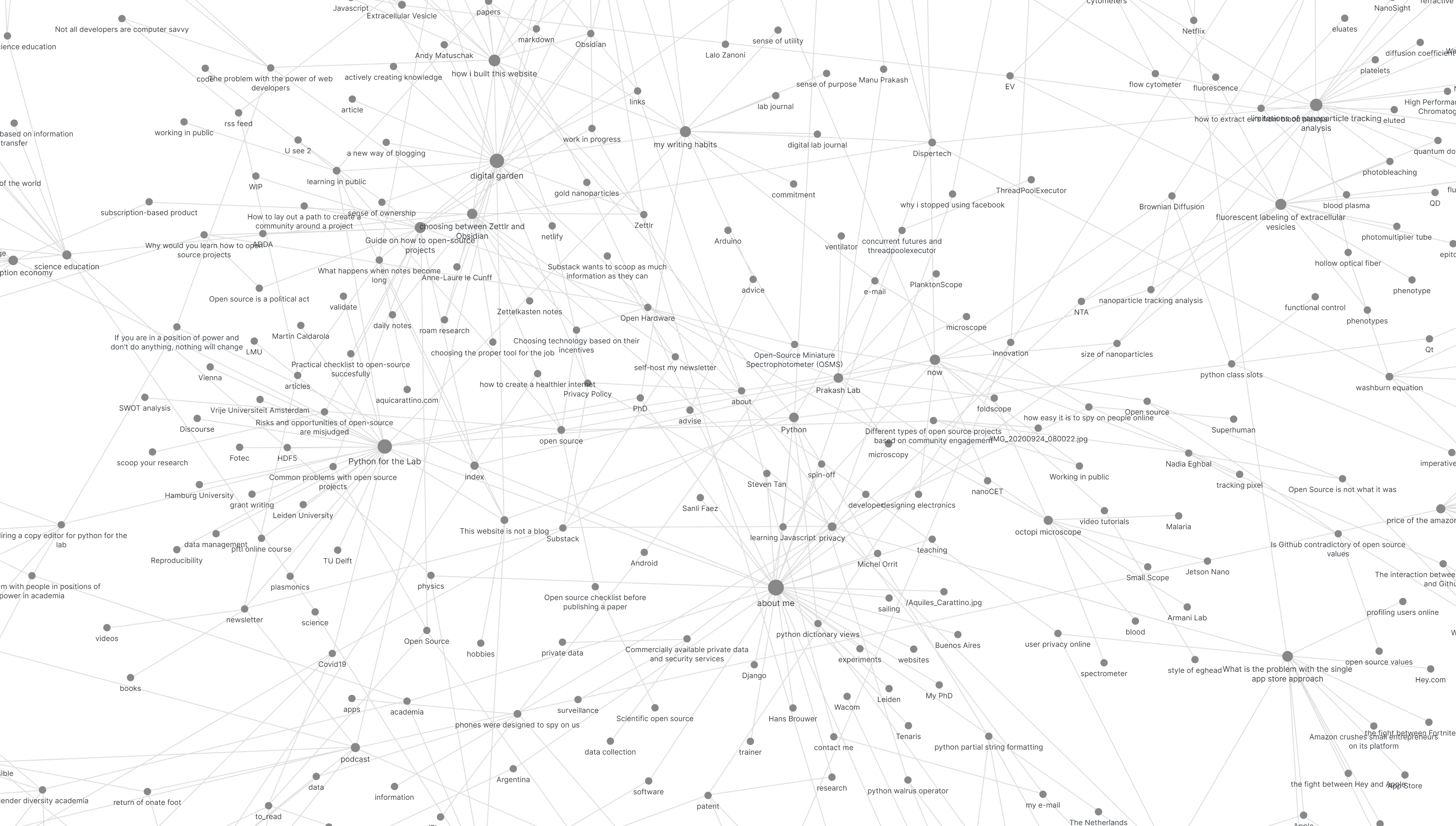Digital gardens for knowledge generation
This article is marked as draft. It is not in its final form.
To make the best of the notes that we take there are different approaches. Luhmann method of note-taking has a very well defined structure, including transient notes, Literature Notes, and permanent notes. However, the digital medium allows a much more flexible approach. For example, we can use backlinks, which is knowing not only where a link goes to, but also how a certain note can be reached. This idea alone enables us to explore possibilities way beyond what Luhmann himself imagined.
Image

On the other hand, while the Zettelkasten method may be very useful for people trying to build new knowledge, publish books or papers, it may become too convoluted for people creating content. For instance, the sources of literature notes can be websites or Twitter threads which are harder to reference properly.
In order to generate new knowledge, we must link together our own observations with those of others. Does not matter if we are a scientist working in a lab, a sociologist, or someone researching topics for a novel. It is only through the combination of new insights and previous explanations that we can increase how much we understand of the universe.
And this is something I specifically disliked about the method described on How to Take Smart Notes. At no single point there is a mention of reality. The entire book lives in the premise that we can build knowledge by reading papers, doing research without ever looking out the window. I think this is both dangerous and ill-fated. The hermeneutic circle is a naïve justification for this passivity.
A Digital Garden is a System
What most people fail to see is that a digital garden is one way of organizing our own insights and experiences. It is rooted in the ideas of Luhmann method, but with a more modern name (and one of the reasons I refrain myself from calling it Zettelkasten).
It extends the possibilities of paper notes by using the digital medium. It means that notes can be modified, extended, erased. Links are easier to build (which may have a downside), and it requires a much lower effort for cataloging and searching.
What is the fuzz about digital gardening, then?. I think it is only a matter of democratizing the access to a method that was kept only for some academic spheres. In pretty much the same way that blogs democratized the possibilities of expression for a lot of people, we are now seeing a democratization of the access to tools for better thinking.
What I like the most about mixing the Luhmann method with a digital garden is the inherent organization of literature notes. When writing a paper, for example, chasing down references can be a very time consuming task. For the pace of modern science, it will still require some work to cite the absolute most up-to-date works, but it eases a lot the frustration of not remembering which paper triggered what idea.
Using a garden to produce knowledge
The most interesting aspect of a garden is its use to produce knowledge and not just to store it. We can't count on gaining new insights and building knowledge only by throwing notes at a system. We must actively seek those links and build upon. Not too different from Hegel's aufhebung concept. If we are organized and work on our garden we can build upon apparently contradicting theses.
To generate knowledge we must start with something. Preferably an observation, or just an idea. For example, "I think there is a correlation between these two variables that can explain this phenomenon". Therefore, we should introduce this new note into our system, and start building and following links. In the paper version, we can actually retrieve the notes and spread them over a table. Some digital programs also allow this, but we can live without.
When we introduce a new note to the system, relationships emerge, especially once the garden is large enough. We can follow the relevant links between notes to start finding older ideas, or topics that seemed completely unrelated. I studied a bit of biology almost 10 years ago, and some of those topics are coming back only now. Things I had forgotten I ever studied are summarized in my own words for my own advantage.
The garden will give us some answers, but most likely it will generate many more questions. How many of these questions must be answered for the work at hand is up to each one. But while we have a repository of questions, unanswered observations, and trigger ideas, we can be sure that our knowledge generating lifetime is still at its peak.
